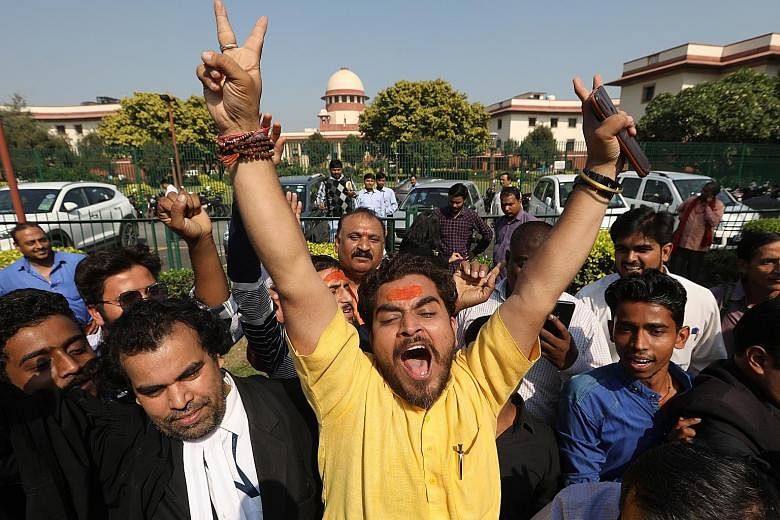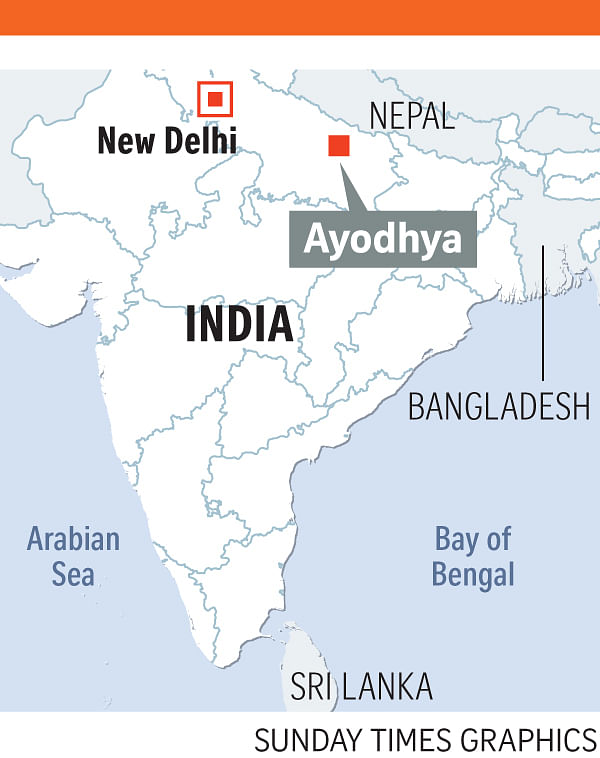India's top court has cleared the path for a Hindu temple to be constructed at a disputed site in Ayodhya city, by awarding custody of the land to a government-appointed trust.
A five-judge bench of the Supreme Court passed a unanimous order yesterday, seeking to end a dispute that has bedevilled Hindu-Muslim ties for centuries, but also potentially further deepening religious polarisation in the country.
The trust comprising Hindu representatives will be set up in the next three months and will manage the construction of the temple at the site in Ayodhya, Uttar Pradesh state. The court has also ordered that 2ha of land be given to Muslims at an alternative site.
The legal conflict over the ownership of the site dates as far back as 1885, but the dispute goes even further back (see sidebar).
More recently, on Dec 6, 1992, the 16th-century Babri mosque on the site was destroyed by a Hindu mob, sparking riots that left more than 2,000 dead.
The Supreme Court yesterday termed the act a "violation of law".
People accused of having participated in and incited the violence, including some Bharatiya Janata Party (BJP) leaders, are still on trial, nearly 27 years later.
The top court's judgment follows as many as 14 appeals against a September 2010 verdict of the Allahabad High Court that had awarded two-thirds of the disputed land to two Hindu parties and the remaining third to a Muslim group.
Mr Zafaryab Jilani, the lawyer for the Uttar Pradesh Sunni Central Waqf Board, one of the Muslim parties in the dispute, said that they will respect the verdict even if it is "not satisfactory".
"Whatever legal recourse is possible... we will adopt," he said, asking all parties not to stage protests.
Ahead of the verdict, security had been reinforced across the country, with prohibitory orders against gatherings of more than four people in Ayodhya and other cities.
More than 500 preventive arrests were made in Uttar Pradesh.
Schools in the state will remain shut tomorrow. Advisories were also issued asking people not to fan communal tension on social media.
Leaders from across different major political parties have welcomed the verdict and appealed for peace.
Tweeting yesterday afternoon, Prime Minister Narendra Modi said the verdict had amicably resolved the dispute and should not be seen as the victory or loss of any one side.
"The calm and peace maintained by 130 crore (1.3 billion) Indians in the run-up to today's verdict manifests India's inherent commitment to peaceful coexistence. May this very spirit of unity and togetherness power the development trajectory of our nation. May every Indian be empowered," he added.
The construction of a temple at the disputed site is a promise that has repeatedly figured in the ruling BJP's election manifestos, including this year's general election.
The main opposition Congress party said it respects the verdict.
"We appeal to all the parties concerned and to all communities to abide by the secular values and spirit of fraternity enshrined in our Constitution and to maintain peace and harmony," it added in a statement.
But the judgment has its share of critics. Mr Nilanjan Mukhopadhyay, a political commentator and author of a book on the dispute, said the decision will give rise to "a second wave of Hindu triumphalism".
"We are certainly going to go through several tense periods in the coming months," he told The Sunday Times.
"The court accepts almost all the arguments of the Muslim side, but when it comes to pronouncing a verdict, they end up doing what has been the political objective of right-wing Hindu groups for the last 30 years, which was to destroy Babri mosque and build a temple on it," he added.
"The demolition happened 27 years ago, and now it is formality for the site to be handed over to Hindu groups. We do not know what dystopian future we are heading into."
Long-drawn dispute
The Ayodhya land dispute between Hindus and Muslims has always had far-reaching political as well as social repercussions in India.
While the first legal case was filed in 1885, the dispute goes farther back into history.
A mosque was built on the 1.12ha plot around 1528 on the orders of Mughal emperor Babur. Hindus, however, claim the site is where their deity, Ram, was born and that the mosque was built on the ruins of a temple.
In 1853, communal clashes between the two communities over the site were first recorded.
Six years later, the British administration put a fence around the site, marking separate areas of worship; Hindus prayed in an outer courtyard and Muslims in an inner courtyard.
The status quo remained for nearly 90 years, reinforced by a security cover.
However, Hindu demands for a temple at the site gained momentum after an idol of Lord Ram appeared mysteriously inside the mosque.
Hindu groups formed a committee in 1984 to spearhead the construction of a temple.
Two years later, a district court ordered the gates of the mosque to be opened and allowed Hindus to worship inside the "disputed structure".
In 1989, foundations of a temple were laid on land next to the "disputed structure", followed by the destruction of the mosque by a Hindu mob in December 1992.


